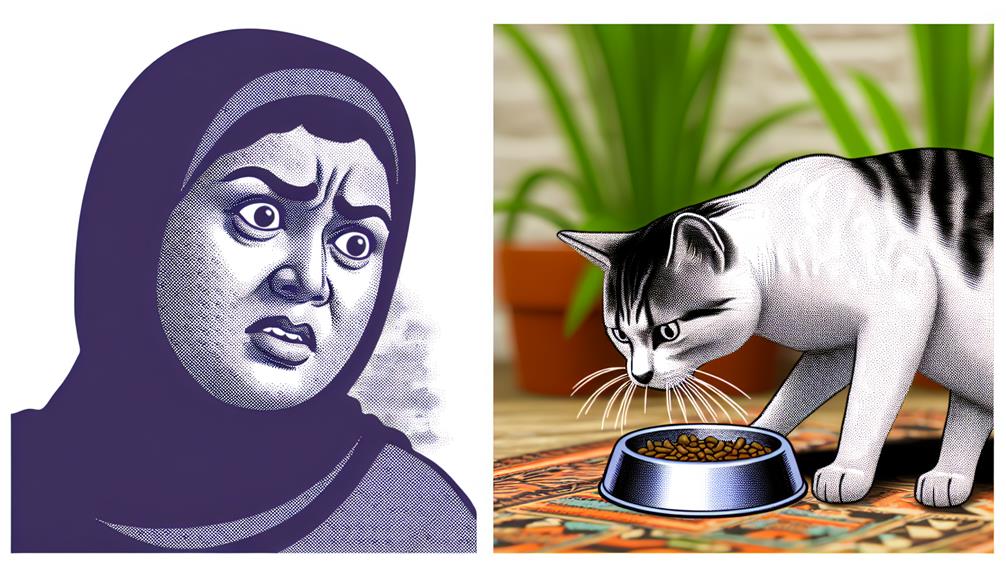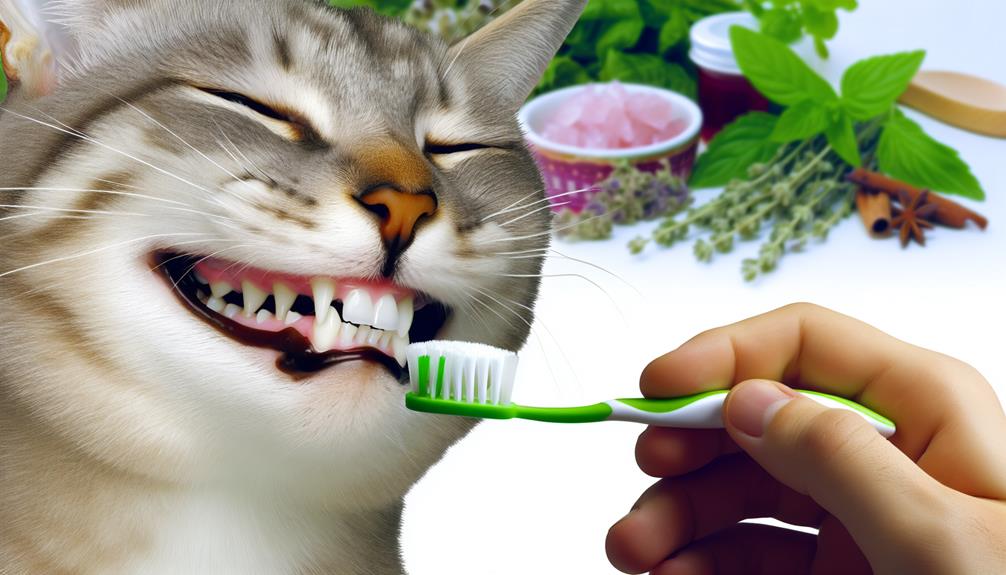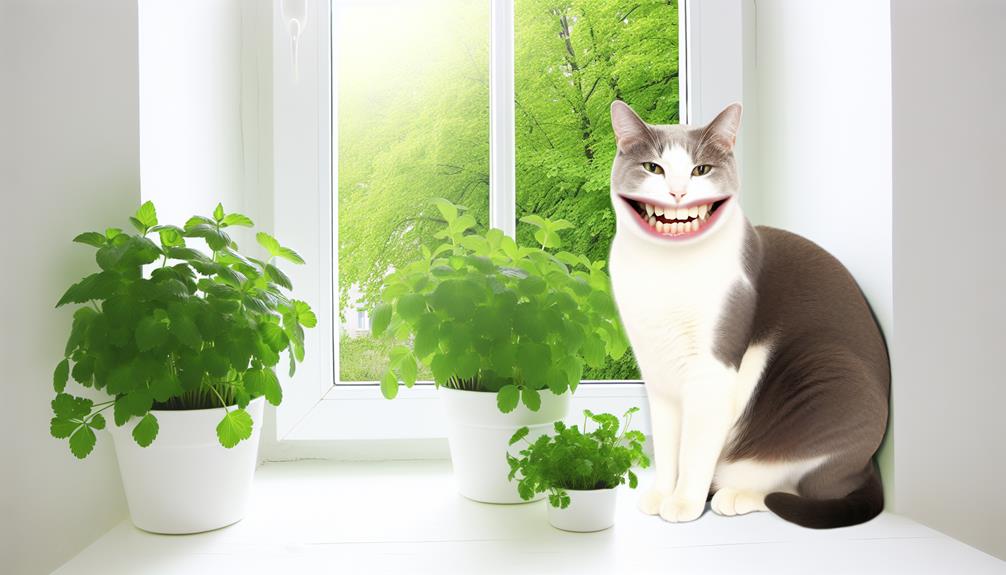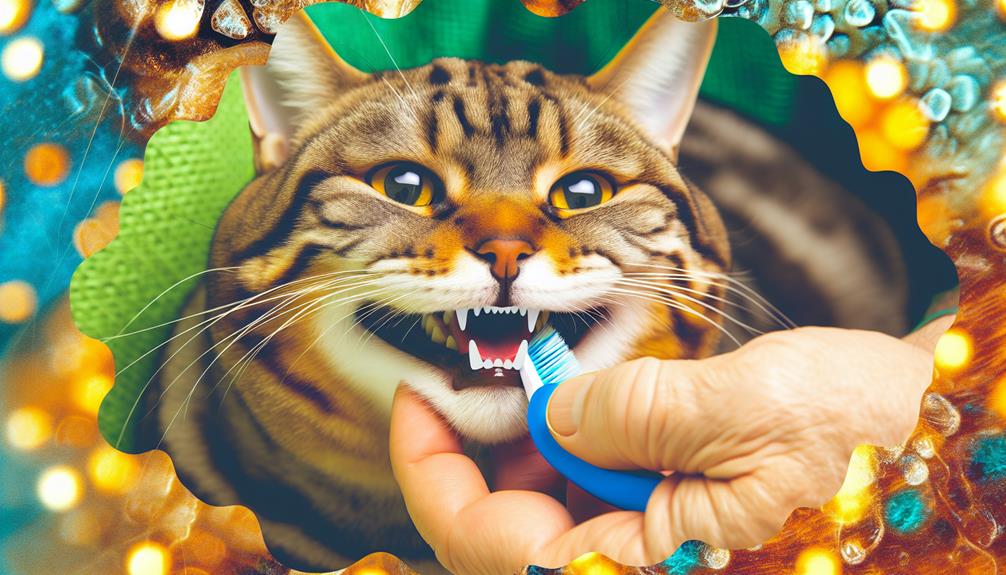Hey there, fellow cat lovers! Today, we're going to talk about something super important – our furry friends' dental health. You see, just like us, cats can have dental problems that cause them pain and discomfort. And we definitely don't want that for our precious feline companions, right? So, how can we tell if our cats are experiencing dental issues? Well, I'm here to tell you about seven warning signs to look out for. Some may surprise you, while others are more obvious. But one thing is for sure – recognizing these signs early on can make a big difference in keeping our cats happy and healthy. So, let's dive in and learn all about it!
Key Takeaways
Key Takeaways:
- Cat owners should watch out for dental problems in their furry friends.
- Bad breath, drooling, trouble eating, pawing at the mouth, red gums, loose or missing teeth, and changes in behavior can be signs of trouble.
- Early detection of dental issues and a visit to the vet can prevent bigger problems and keep your cat's teeth healthy.
- Taking care of your cat's teeth can help prevent pain and discomfort.
- Regular dental check-ups can help maintain your cat's overall health and well-being.
- Proper dental care can improve your cat's quality of life and extend their lifespan.
- Educating yourself about cat dental health can help you better care for your furry friend.
Bad Breath
Why Does My Cat Have Bad Breath?
Have you ever been close to your cat and noticed a not-so-pleasant smell coming from their mouth? That's what we call bad breath, or halitosis. Just like humans, cats can also have stinky breath, and it can be quite common. But why does it happen?
Causes of Bad Breath in Cats:
- Poor Dental Hygiene: Just like us, cats need to take care of their teeth too! If they don't practice good dental hygiene, it can lead to bad breath.
- Periodontal Disease: This is a fancy term for gum disease. When plaque and tartar build up on your cat's teeth, it can cause inflammation and infection in their gums, leading to bad breath.
- Health Conditions: Sometimes, bad breath can be a sign of an underlying health problem in your cat. Issues like kidney disease or diabetes can cause bad breath, among other symptoms.
How to Prevent Bad Breath in Cats:
- Brush Their Teeth: Yes, you read that right! You can actually brush your cat's teeth. Use a cat-specific toothbrush and toothpaste to remove plaque and bacteria from their teeth. It may take some practice and patience, but it's worth it!
- Dental Chews or Treats: Just like we chew gum or eat mints to freshen our breath, cats can benefit from dental chews or treats. These can help clean their teeth and freshen their breath at the same time.
- Regular Vet Check-ups: Taking your cat to the vet regularly is important for their overall health, including their dental health. During these check-ups, the vet can perform a professional dental cleaning to remove any plaque or tartar buildup and keep their mouth healthy.
Excessive Drooling
Why is My Cat Drooling So Much?
Have you ever noticed your cat drooling a lot more than usual? It could be a sign of something going on with their health. Let's dive into the possible causes and what you can do about it.
Possible Causes of Excessive Drooling in Cats:
- Dental Issues:
- Gum disease
- Tooth decay
- Oral infections
- Oral Ulcers or Lesions:
- Infections
- Systemic diseases
- Other Health Conditions:
- Kidney disease
- Liver disease
- Gastrointestinal disorders
What Should You Do?
If you notice your cat drooling excessively, it's important to take them to the vet. They can determine the underlying cause and provide the appropriate treatment.
Treatment Options:
- Dental Issues:
- Thorough dental cleaning
- Tooth extractions, if necessary
- Underlying Health Conditions:
- Treatment focused on addressing the primary problem
Remember, excessive drooling in cats should not be ignored. It could be a sign of serious dental issues or health conditions. Seeking prompt veterinary care can help your cat feel better and ensure their well-being.
Difficulty Eating or Chewing
Having trouble eating or chewing can be a sign that something's not right with your cat's teeth. One clear indication is if your furry friend is drooling excessively or has bad breath. These could mean there's pain or discomfort in their mouth. Another sign to look out for is if your cat keeps pawing at their mouth. If you notice any of these symptoms, it's important to take your cat to the vet. They'll be able to identify and fix any dental issues that might be causing the problem. Your cat's health is important, so make sure to get them the care they need.
Drooling or Excessive Salivation
Why Do Cats Drool So Much?
Have you ever noticed your cat slobbering all over the place? It might seem strange, but excessive drooling in cats can actually be a sign of dental discomfort. Just like humans, cats can experience oral pain and discomfort, which can make it difficult for them to eat or chew their food properly.
Here are some key points to know about excessive salivation in cats:
- Dental Problems: Excessive salivation in cats is often caused by dental problems like periodontal disease, tooth decay, or oral infections. These issues can be painful and make it hard for your cat to eat.
- Difficulty Eating: When a cat is in pain, they may drool excessively, and this can make it challenging for them to eat or chew their food properly. As a result, they may lose weight and not get the nutrients they need.
- Importance of Monitoring: It's important to keep an eye on your cat's eating habits and look out for any signs of drooling or excessive salivation. If you notice these symptoms, it's a good idea to take your cat to the veterinarian for a dental examination.
- Prompt Treatment: The sooner you address your cat's dental issues, the better. A veterinarian can perform a thorough examination and provide appropriate treatment to alleviate your cat's oral pain and discomfort.
Bad Breath or Halitosis
Why Does My Cat's Breath Stink?
Have you ever noticed that your cat's breath smells really bad? Well, there's actually a reason for that! Let's find out why cats sometimes have stinky breath and what we can do to help them.
Causes of Bad Breath in Cats:
- Poor Dental Hygiene: Just like humans, cats need to take care of their teeth too! If they don't, bacteria can build up in their mouths and cause bad breath.
- Dental Problems: Cats can also experience tooth decay, gum disease, or oral infections, which can all lead to that unpleasant odor in their breath.
- Difficulty Eating: If your cat is having trouble eating or chewing because of dental issues, they may develop bad breath as a result. This can be a sign that something is wrong and they need to see a vet.
How to Help Your Cat:
- Regular Check-ups: Make sure to take your cat to the vet for regular check-ups. They can examine your cat's teeth and gums to catch any problems early on.
- Brushing Their Teeth: Yes, you read that right! Cats can have their teeth brushed too. Ask your vet for a special toothbrush and toothpaste made just for cats.
- Dental Treats and Toys: There are also special treats and toys that can help keep your cat's teeth clean. These can be a fun way for them to maintain good dental health.
Pawing at the Mouth
Why Do Cats Paw at Their Mouths?
Have you ever noticed your cat pawing at their mouth? It might seem like a strange behavior, but it could be a sign that something is wrong with their oral health. Let's explore four important things to know about this pawing behavior and dental sensitivity in cats:
- Pain or Discomfort: When cats paw at their mouth, it could mean they are in pain or discomfort while eating or chewing. This could be due to dental issues like tooth decay, gum disease, or oral infections.
- Trouble Eating: Cats might have difficulty eating or even avoid eating altogether if they're in pain. This can lead to weight loss, malnutrition, and a decline in their overall health.
- Changes in Behavior: Cats may show changes in their behavior, like being more irritable or aggressive. This could be because they're experiencing discomfort while eating.
- Importance of Veterinary Care: If you notice your cat pawing at their mouth or having trouble eating, it's crucial to seek veterinary care. A veterinarian can examine your cat and identify any underlying dental issues. They can also provide treatment to ensure your cat's oral health and overall well-being.
Pawing at the Mouth
Why Does My Cat Keep Pawing at Its Mouth?
Have you ever noticed your cat constantly pawing at its mouth? It turns out that this behavior could be a sign of dental problems. Just like humans, cats can experience discomfort or pain in their mouths, and pawing at their mouth is their way of trying to alleviate it. But don't worry, there are things you can do to help!
Here are some tips for maintaining your cat's dental health:
- Brush their teeth regularly: Yes, you read that right! Just like you brush your teeth, cats can benefit from regular brushing too. Use cat-specific toothpaste and a soft toothbrush to remove plaque buildup and prevent tartar formation.
- Provide dental chews and toys: Chewing on the right things can actually help keep your cat's teeth clean and healthy. Look for dental chews and toys specifically designed for cats to help reduce plaque and tartar.
- Look out for red and swollen gums: If your cat's gums look red and swollen, it could be a sign of dental problems. This can cause them to paw at their mouth even more. If you notice this, it's important to seek veterinary attention to determine the underlying cause and get the appropriate treatment.
It's worth noting that pawing at the mouth doesn't always mean dental problems. Other potential causes could be mouth sores, foreign objects in the mouth, or even oral tumors. That's why it's important to consult a veterinarian if your cat displays this behavior.
Red and Swollen Gums
Why Do Cats Get Red and Swollen Gums?
Have you ever noticed that your cat's gums are red and swollen? Well, it turns out that this could be a sign of dental problems. Just like humans, cats can have issues with their teeth and gums too. But don't worry, there are some things you can do to help prevent and treat these problems.
Here are four important things to know about cat dental care:
- Brushing is important: Yes, you heard that right. Cats can benefit from regular brushing just like we do. Using a special toothbrush and toothpaste made for cats, gently brush your cat's teeth every day. It might sound strange, but it can really help keep their teeth and gums healthy.
- Special diets can help: Did you know that there are special foods made just for cats to improve their dental health? These dental diets can reduce plaque and tartar buildup, which can lead to gum disease. So next time you're at the pet store, look for food that promotes oral health.
- Treats and toys for healthy teeth: Who doesn't love treats and toys? Well, cats do too! And guess what? There are treats and toys that can actually help keep their teeth and gums healthy. These special treats and toys are designed to encourage chewing, which helps remove plaque and tartar. So give your cat something fun to chew on!
- Vet visits are a must: Just like we need to go to the dentist, cats need to visit the vet for their dental health. Regular professional cleanings by a veterinarian are important for keeping your cat's teeth and gums in tip-top shape. These cleanings involve removing plaque and tartar buildup and addressing any other dental issues your cat may have.
Loose or Missing Teeth
Why are cats losing their teeth? Let's find out!
Have you ever noticed your cat's teeth looking loose or even missing? It might be a sign of a dental problem. Just like humans, cats can experience tooth decay and gum disease. But what causes these issues in our feline friends?
Here's the scoop: Tooth decay happens when plaque and tartar build up on a cat's teeth. This leads to bacterial growth and erosion of the teeth. If left untreated, it can result in tooth loss. Gum disease, or periodontal disease, occurs when bacteria infect the gums, causing inflammation and damage to the teeth and bones around them. This can make the teeth become loose or even fall out.
So, how can we tell if our cat is experiencing loose or missing teeth? Look out for these signs:
- Difficulty eating: If your cat is having trouble chewing or seems to be in pain while eating, it could be because of loose or missing teeth.
- Drooling: Excessive drooling can be a sign of dental issues, including loose or missing teeth.
- Bleeding gums: If you notice blood in your cat's mouth or on their toys, it could be a sign of gum disease.
- Bad breath: We all know that cats don't have the freshest breath, but if it's really bad, it could be a sign of dental problems.
- Pawing at the mouth: If your cat is constantly pawing at their mouth or face, it could be because of tooth pain.
If you notice any of these signs, it's important to take your cat to the veterinarian as soon as possible. They will examine your cat's mouth and may recommend dental X-rays to see the extent of the problem. Treatment options could include professional dental cleaning, tooth extractions, and implementing a dental care routine at home.
But remember, prevention is key! To help keep your cat's teeth healthy and prevent tooth decay and gum disease, here are some tips:
- Regular dental check-ups: Just like we go to the dentist, cats should have regular check-ups too!
- Brush their teeth: Yes, you read that right! Brushing your cat's teeth can help remove plaque and prevent tooth decay. Just make sure to use a toothbrush and toothpaste made specifically for cats.
- Dental treats and toys: There are plenty of treats and toys available that can help keep your cat's teeth clean and healthy.
Behavioral Changes
Are you a cat owner? Have you ever noticed any strange behaviors in your furry friend? Well, did you know that these behaviors could be a sign of dental problems? That's right! Just like humans, cats can have dental issues too. And it's important for us to be aware of these changes and take action to keep our cats healthy and happy. Let's talk about four common behavioral changes that may signal dental problems in cats:
- Does your cat have a decreased appetite? If your cat is avoiding certain types of food or not eating as much as usual, it could be because they're experiencing pain or discomfort while eating. This could be a sign of dental problems.
- Is your cat suddenly acting more aggressive or irritable? Dental pain can make cats cranky and defensive. They may snap or hiss when approached or touched, especially around their mouth area. So if your cat is acting out of character, their dental health might be the culprit.
- Have you noticed any changes in your cat's grooming habits? Cats with dental issues may groom themselves less frequently or stop grooming altogether. This could be because grooming is painful for them or they're having trouble reaching certain areas of their mouth. So if your cat's fur is looking a bit messy, it might be time to check their teeth.
- Is your cat meowing more than usual or making unusual sounds? Cats in pain might express their discomfort through changes in their vocalization patterns. So if your cat is suddenly meowing a lot or making strange noises, it could be a sign that something is wrong with their dental health.
Frequently Asked Questions
Can Dental Problems in Cats Be Prevented With Regular Brushing?
Frequently Asked Questions about Preventing Dental Problems in Cats:
Q: Why is it important to prevent dental problems in cats?
A: Preventing dental problems in cats is important because it helps maintain their oral health. Dental issues can cause pain, difficulty eating, and even lead to other health problems. By taking care of their teeth, we can keep our furry friends happy and healthy.
Q: How can regular brushing help prevent dental problems in cats?
A: Regular brushing is an important part of dental care for cats. It helps remove plaque and tartar buildup, which can lead to gum disease and tooth decay. By brushing their teeth regularly, we can keep their mouths clean and reduce the risk of dental issues.
Q: Are there special products we can use to help prevent dental problems in cats?
A: Yes, there are dental care products available for cats. These include toothbrushes designed for cats, as well as toothpaste that is safe for them to swallow. Using these products along with regular brushing can further help prevent dental problems.
Q: How often should we brush our cat's teeth?
A: Ideally, we should brush our cat's teeth every day. However, if that's not possible, aim for at least a few times a week. Consistency is key to maintaining their oral health and preventing dental problems.
Q: What can happen if we don't take care of our cat's teeth?
A: If we don't take care of our cat's teeth, they can develop dental problems like gum disease, tooth decay, and bad breath. These issues can be painful and may require expensive veterinary treatments. It's best to prevent them by practicing regular dental care.
Q: Can cats develop dental problems even with regular brushing?
A: While regular brushing greatly reduces the risk, cats can still develop dental problems. Some cats are more prone to dental issues due to genetics or other factors. That's why it's important to also watch for signs of dental problems and schedule regular check-ups with the veterinarian.
Q: What are some signs of dental problems in cats?
A: Some signs of dental problems in cats include bad breath, difficulty eating, drooling, pawing at the mouth, and inflamed gums. If you notice any of these signs, it's important to have your cat's teeth checked by a veterinarian.
Are There Any Specific Cat Toothpaste or Dental Treats Recommended for Maintaining Oral Health?
Frequently Asked Questions:
Q: Why is oral health important for cats?
A: Just like humans, cats can develop dental problems like tooth decay and gum disease. Taking care of their oral health is essential to prevent pain, infections, and potential health issues in other parts of their body.
Q: What is cat toothpaste?
A: Cat toothpaste is a special kind of toothpaste made specifically for cats. It is different from human toothpaste because it is safe for cats to swallow. Cat toothpaste comes in flavors like chicken or fish to make brushing more appealing to them.
Q: How does cat toothpaste help maintain oral health?
A: Cat toothpaste contains ingredients that help remove plaque and tartar from your cat's teeth. Regular brushing with cat toothpaste can prevent dental problems and keep their breath fresh. It's important to use cat toothpaste instead of human toothpaste because human toothpaste can be toxic to cats.
Q: Can I use my toothpaste on my cat?
A: No, it is not safe to use human toothpaste on cats. Human toothpaste contains ingredients like fluoride and foaming agents that can be harmful if swallowed by cats. Always use cat toothpaste to ensure their safety.
Q: What are dental treats for cats?
A: Dental treats are special treats designed to promote oral health in cats. They are usually crunchy and have a texture that helps remove plaque and tartar as your cat chews on them. Dental treats can be a tasty way to supplement your cat's oral care routine.
Q: How do dental treats help maintain oral health?
A: Dental treats are designed to provide mechanical cleaning to your cat's teeth. As your cat chews on the treat, the texture helps scrape off plaque and tartar buildup. However, it's important to remember that dental treats should not replace regular brushing with cat toothpaste.
Q: Are there any specific cat toothpaste or dental treats recommended?
A: There are various cat toothpaste brands available, such as Virbac CET Enzymatic Toothpaste and Petrodex Enzymatic Toothpaste. For dental treats, brands like Greenies Dental Treats and Feline Greenies Dental Treats are popular choices. It's always a good idea to consult with your veterinarian to find the best options for your cat's specific needs.
How Often Should I Take My Cat to the Veterinarian for a Dental Check-Up?
Frequently Asked Questions:
Q: How often should I take my cat to the vet for a dental check-up?
A: It's important to take your cat to the vet for a dental check-up at least once a year. This helps to catch any dental problems early and prevent them from getting worse.
Q: Why are dental check-ups important for my cat?
A: Dental check-ups are important because they help keep your cat's teeth and gums healthy. Just like humans, cats can get dental problems like cavities and gum disease. Regular check-ups help prevent these problems and keep your cat's mouth in tip-top shape.
Q: What happens during a dental check-up for cats?
A: During a dental check-up, the vet will examine your cat's teeth and gums to look for any signs of trouble. They may also clean your cat's teeth and remove any tartar or plaque buildup. This helps keep your cat's mouth clean and prevents dental problems.
Q: How can I tell if my cat has dental problems?
A: There are a few signs you can look out for. If your cat has bad breath, drools excessively, or has red or swollen gums, these could be signs of dental problems. You may also notice your cat having difficulty eating or pawing at their mouth. If you see any of these signs, it's best to schedule a dental check-up with your vet.
Q: What can happen if I don't take my cat for regular dental check-ups?
A: If you don't take your cat for regular dental check-ups, dental problems can get worse. This can lead to pain, difficulty eating, and even tooth loss. It's important to catch these problems early to prevent them from causing more serious issues.
Q: How can I help keep my cat's teeth clean between check-ups?
A: There are a few things you can do to help keep your cat's teeth clean. Brushing their teeth regularly with a cat-friendly toothbrush and toothpaste can help remove plaque and prevent tartar buildup. You can also give your cat dental treats or toys designed to promote oral health. It's important to talk to your vet about the best options for your cat.
Are There Any Home Remedies or Natural Treatments for Dental Problems in Cats?
Frequently Asked Questions:
Q: Can I use home remedies to treat my cat's dental problems?
A: While there are some home remedies that may provide temporary relief, it's important to consult a veterinarian for a proper diagnosis and treatment plan. They have the knowledge and experience to address dental issues effectively.
Q: Why should I consult a veterinarian for my cat's dental problems?
A: Veterinarians are trained professionals who can properly diagnose and treat dental issues in cats. They have the expertise to identify the root cause of the problem and provide appropriate treatment options.
Q: What are some signs of dental problems in cats?
A: Look out for signs like bad breath, difficulty eating, drooling, tooth discoloration, and swollen gums. If you notice any of these symptoms, it's important to take your cat to the vet for a dental check-up.
Q: Can I prevent dental problems in my cat?
A: Yes, you can! Regular dental care is key. Brushing your cat's teeth, providing dental treats or toys, and feeding them a balanced diet can help keep their teeth and gums healthy. Regular check-ups with the vet are also important for preventive care.
Q: Are there any natural treatments for dental problems in cats?
A: While there are no specific natural treatments for dental problems, you can help maintain your cat's oral health by feeding them a balanced diet with crunchy kibble, providing dental treats or toys, and practicing good dental hygiene.
Q: Why is it important to address dental problems in cats?
A: Dental problems in cats can cause pain, discomfort, and may lead to other health issues. By addressing dental problems early on, you can prevent further complications and ensure your cat's overall well-being.
Q: How often should I take my cat to the vet for dental check-ups?
A: It is recommended to take your cat for a dental check-up at least once a year. However, your vet may suggest more frequent visits depending on your cat's dental health and specific needs.
Q: Can I use human toothpaste to brush my cat's teeth?
A: No, you should never use human toothpaste for cats. Human toothpaste contains ingredients that can be toxic to cats if swallowed. It's best to use toothpaste specifically formulated for cats, which you can find at pet stores or from your vet.
Can Dental Problems in Cats Lead to Other Health Issues?
Q: Can dental problems in cats cause other health issues?
A: Yes, dental problems in cats can lead to other health issues. If not taken care of, these problems can cause infections, loss of teeth, and even infections in other parts of the body. That's why it's important to take your cat for regular check-ups at the vet and make sure they have good dental care. Your vet might also recommend certain products to help keep their teeth healthy. If you're thinking about trying alternative treatments, it's best to talk to your vet first.
Conclusion
So, remember, it's super important for cat owners to watch out for dental problems in their furry friends. Bad breath, drooling, trouble eating, pawing at the mouth, red gums, loose or missing teeth, and changes in behavior can all be signs of trouble. Catching these issues early and getting your cat to the vet can prevent bigger problems and keep your cat's teeth healthy. Take care of those pearly whites and keep your kitty smiling! Share your thoughts or learn more about cat dental health with us!




